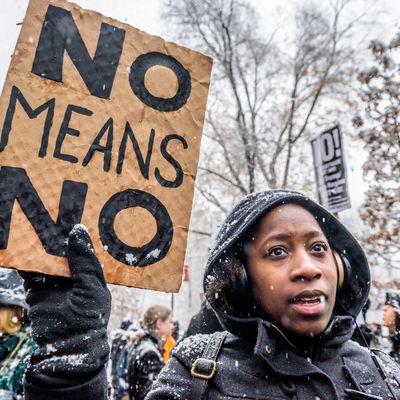
So many powerful things have been published about sexual harassment since the Weinstein scandal blew up this fall — searing, brilliant, upsetting attempts to grasp the feelings such a complex moment brings about. And then there was Daphne Merkin’s piece in the New York Times on January 5.
Merkin, in what seems like an ill-conceived attempt at provocation, added her thoughts to a growing body of #MeToo criticism, which Slate helpfully explains as the school of thought that holds that “in our eagerness to bring the worst of the wrongdoers to long-overdue justice, women are ruining the lives of innocent men, punishing good people for being bad flirts, and threatening to make consensual sex a rare, robotic experience.”
The article is too all over the place to summarize neatly here, but the core gripe seems to be that while many feminists are publicly declaring themselves in support of the cause, privately, they are “rolling their eyes,” having had it with “the reflexive and unnuanced sense of outrage that has accompanied this cause from its inception.”
As the article made the rounds on Twitter, almost every young woman I follow began to reject it. “Which wave of feminism is the one in which nobody says ‘Whatever happened to flirting?’ That’s the one I’m in,” wrote Maris Kreizman.
Here we have one of the clearest examples of a generation gap that I’ve seen. Despite saying in the beginning of the article that women she knows “of all ages” seem to agree with her, Merkin posits herself in opposition to young women at several points, referring to them as “zealots” who perceive themselves to be “frail as Victorian housewives.”
Speaking on behalf of “longstanding feminists,” she blames the younger women doubly. First for not taking the risk associated with affirmative rejection, and secondly for ruining “eros.” According to her, a majority of women she knows have successfully fought off workplace harassers with statements like “Get your hands off me right now.” Whereas, seeking affirmative consent is “innately clumsy and retrograde, like going back to the childhood game of ‘Mother, May I?’”
The only retrograde thing here is Merkin’s understanding of feminism, which asks women to bear the full brunt of navigating sexism and gets squeamish about appearing too dangerous to men. I recognize this approach because I too grew up thinking that as a feminist it was my job to succeed despite the terms of the patriarchy. Straight-up changing the game seemed impossible. So I understand Merkin’s desire to wear her battle wounds like signs of strength rather than seeing herself as a victim of a rigged system. But it’s a fool’s game. The word reckoning has been used repeatedly to describe what we’re going through as a culture, and one of the things we need to reckon with is what women should expect from men and from themselves.
Personally, this moment — and working closely with a group of young women every day — has made me reconsider deeply held assumptions about feminism and how I respond to men. Routine workplace annoyances, bad dates, and sexist behavior that I laughed off or thought I was tough enough to take, now strike me as so absurd I can’t believe I just let them slip. My conversations with the Cut staff have had a lot to do with changing how I see things. What I might have ignored, they see as unacceptable. And that’s good! It’s okay to change your opinion. Cathartic even!
The last few months have been disorienting to say the least. Trying to process them in real time has proven challenging but also, thrilling. Will some people have misgivings? Of course. But we do need to find a way forward, and it’s not by upholding Merkin’s status quo. Why not take the best lessons from both generations? Advocate for both affirmative rejection and affirmative consent. Advocate for a world where women feel powerful and safe enough to assert themselves in all situations — one where women of all ages can enforce the rules we help make.


